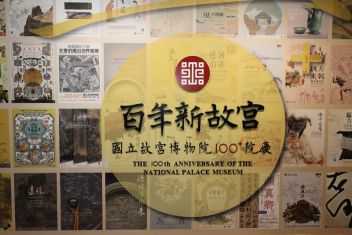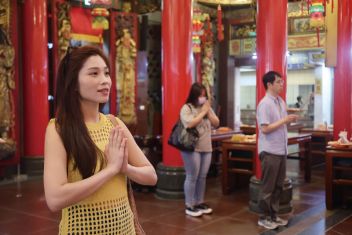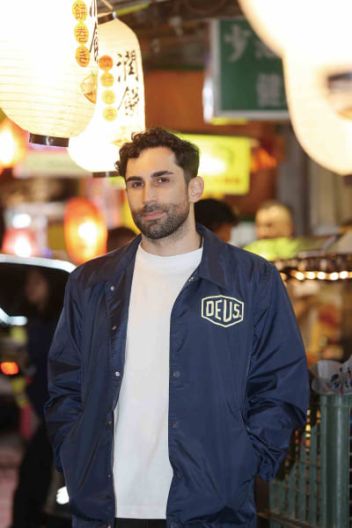
At Kyle Hsieh’s Old House Inn, even light and shadow are key elements that the owner takes great care over. (photo by Kent Chuang)
When it comes to service, the British emphasize elegance, while the Japanese focus on meticulousness, but both tend to generate a sense of aloofness. But in Taiwan, this little Pacific island off the coast of East Asia, friendliness does not need to be “unzipped,” and personable hospitality is in endless supply. This is what makes visitors into regulars, eager to come back over and over.
So how does one get to feel this hospitality for oneself? Come stay a night in Taiwan!
Good times in Old Tainan
Hidden away in the heart of Tainan is Old House Inn, its address unclear and its Internet presence practically nil. But even so, if you want to be able to park your luggage here, you’ll need to book three months in advance.
The owner of Old House Inn is Kyle Hsieh, who had the idea to convert the old family home into a bed-and-breakfast over a decade ago when he noticed such houses being torn down all over the city. Taking advantage of the whole family having moved out, Hsieh renovated the place top to bottom, hoping to make it a model showcasing the value still present in old homes.
“Time is what makes these old places so interesting and so valuable,” he says. In the course of converting his old home, he didn’t want to wash away the marks time had left on it, so he aimed to preserve about 70% of its original state, presenting it in three incarnations: its original look, the adjustments made as the children grew up, and its modern role as a B&B. For example, the ceiling lamp in the lounge has been reverted back to the original cream-colored hanging lamp, but the marks left by its one-time replacement fluorescent lamp remain visible. It is these little details, these remnants of times past, that have become the starting point for telling the story of the Hsieh family.
Every time he leads people through the place, Hsieh spends a good hour telling the tales of the various little details in each nook and cranny. In the remodeled kitchen, there is an entrancing interplay of light and shadow throughout the day as the sunlight streams in through clear corrugated plastic sheeting and bamboo lattices. In the lounge is a big round table, but be careful not to push down on it: “When I was a kid, my dad wanted to teach us all how to eat with proper manners, so he deliberately left the tabletop loose. If we pushed on one side, the other would shoot up.” It is little details of everyday life like this that give Old House Inn its homey feeling. In opening up his home to guests, Hsieh hopes his visitors will take care of the old place while also becoming more aware of the importance of preserving others like it.
Service from the heart
Hsieh has put as much thought into creating his own approach to hospitality as he has into the physical experience of Old House Inn. “We don’t have a set SOP for our services,” he says. “Instead, whenever someone books a room, we do our best to understand what they really need and craft the most appropriate service for them.”
Rather than having guests just head straight in and chuck their luggage in their rooms, Old House Inn organizes a meeting place, and a concierge leads them on a walk to the place, introducing the neighborhood along the way. “The journey takes about five minutes, and we hope that through this calm stroll, guests will be able to adjust to the pace of Tainan by the time they get here.” Along the way, the concierge uses the opportunity to gauge the guests’ situations and moods. Old House Inn’s services actually start even earlier, though—Hsieh has even worked with taxi drivers to provide lessons in good service, helping create a friendlier environment for visitors from the moment they arrive in Tainan right through their stay at the inn.
“Staying at a B&B is like moving in with the owner’s tastes; the guests want to get involved.” Born and raised in Tainan, Hsieh will take guests out to play basketball, go skateboarding, or watch the sunset, tapping his personal contacts and sharing with his guests as though they were friends. He even works with local eateries and leisure industry businesses to help his guests experience the essence of Tainan in the shortest possible time.
At Old House Inn itself, the service is even more heartfelt. “For me, real service should touch the heart.” A few years ago, when Tainan was struck by a major earthquake, water pipes burst and left Old House Inn without water. “The easiest solution would have just been to just bow down and refund everyone’s money, but even then they’d still be stuck in the same situation, so instead I organized some people to haul water manually, spending three hours filling up the water tank on the fifth floor.” Putting himself in his guests’ shoes and coming up with solutions is at the core of Hsieh’s approach to hospitality.
Over the past 12 years, Kyle Hsieh has kept busy repairing eight different old homes. In some years he has hosted guests from as many as 24 different countries. “Now everyone who comes to Tainan knows that old houses are the best places to stay.” This year, in his efforts to help people get to know Tainan better, Hsieh is branching out even further, expanding into Japan with an Old House Inn in the city of Kanazawa and introducing still more people to Tainan-style hospitality.

The best service is service that’s there right when you need it,” says Shen. (photo by Kent Chuang)
Downhome Taiwanese service
Winston F.C. Shen laughs enthusiastically as he speaks. The CEO of Hotel Royal Group and general manager of Hotel Royal Chiaohsi in Jiaoxi, Yilan County, Shen previously released a book entitled Service with a Taiwanese Flavor: Winston Shen Shows the Way. He is a peerless choice for talking about Taiwanese-style hospitality.
“In a highly standardized industry, one can still differentiate oneself with a warm, personal touch, and that is the essence of service with a Taiwanese flavor,” writes Shen in his book.
The American style tends toward feigned familiarity, he says, while the British tend toward refinement and elegance and the Japanese toward attention to detail, both with a touch of aloofness. But Taiwanese pride themselves on their warm, amiable, natural, and courteous attitude, and that is what characterizes the Taiwanese style of service.
At wet markets, stallholders might throw in some shallots when you buy some vegetables, or maybe a couple of chilies if the price of shallots has gone up. If you’re a regular, stores will serve you with generosity, throwing in a little bonus in a show of friendship.
Taipei may be an international metropolis where people tend to be a little colder and more indifferent in public, but at your regular breakfast shop or convenience store, the proprietor is still just as apt to tailor their services to your needs. Generally speaking, such personal service in other countries is reserved for VVIPs, says Shen, but in Taiwan you’ll find it anywhere and everywhere. On top of that, one of the lasting impressions foreign visitors have of Taiwan is of the warmth of the people; Taiwanese are always eager to share tips on good places to eat or fun places to go for no other reason than that’s how they would treat a friend.
Making memories
Hotel Royal Chiaohsi was established 15 years ago as the first five-star hotel in Yilan County, and throughout, its staff have employed this Taiwanese-style approach to service, creating loyal customers who come back again and again.
If you stay there, you’ll almost certainly see Shen at the counter chatting with guests or setting tables and serving diners in the restaurant in the morning. He may be CEO, but he still likes to get in amongst the frontline staff and interact with the guests personally. Understanding what guests want and putting that into practice is at the core of the Hotel Royal approach to hospitality. Hotel Royal Chiaohsi’s motto is “Keen awareness, proactive response, constant learning, and eager engagement.”
“The best service is service that’s there right when you need it,” says Shen. In the hotel, the service staff encounter guests countless times each day, but finding opportunities to serve takes keen perception and observation, followed by a proactive response from the staff. For example, a staff member happened to overhear a conversation between a husband and wife as he passed by, with the wife saying she was feeling a little cold, so he doubled back and fetched a blanket to help her keep warm. And in our smartphone age, all the hotel’s counters lend out power banks and cables so that guests needn’t worry about staying charged up. Such are the ways the observations of service staff become a part of the hotel’s services.
A lot of guests come to the hotel for their birthday, to propose to their significant other, or to celebrate important anniversaries, and these are great chances for “eager engagement.” Shen wants to avoid hotel celebrations becoming rote, so he encourages the staff to inject a little of themselves into them. For example, he will personally write cards for guests to thank them for choosing Hotel Royal Chiaohsi for their big day and for making the hotel a part of their memories.
Details like this are what makes a hotel’s service culture. One guest, a housewife, once told Shen that it was because she felt taken care of at Hotel Royal Chiaohsi that she wanted to come back again and again. At home, she had to take care of a whole family, old and young alike, but at the hotel, she was the one being so thoughtfully cared for, and that experience left her profoundly moved.
“It’s like being in a little relationship with the guest,” says Shen. “We want every guest to think back positively on their time with us after they leave,” he continues, “and that’s the real value of the services we provide.”











